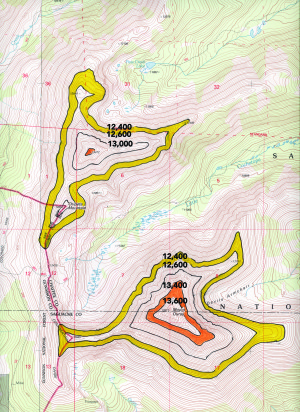By Martha Quillen
So far this season, the 2016 candidates have insulted immigrants, refugees, environmentalists, Muslims, Christians, the unemployed, undereducated, and whoever else was handy. And in the least charitable campaign ever, Donald Trump promised to kick out Mexican migrants; forsake homeless refugees; keep out Muslims; and arm our southern border against exploited children trying to escape Latin America. Trump also threatened numerous countries directly, challenged everyone who criticized him; scared the Brits; alarmed the Pope; and convinced half of America he’s dangerous.
At first, I didn’t understand Trump’s appeal. Then I realized what he was offering. Americans are at the end of a long, slow recovery that has left many in the working class barely holding on. They’re tired and disillusioned and have lost status, assets, prospects and hope. And that’s especially true of Trump’s followers, who are white conservatives who are usually identified as poorer and less educated than average voters. Trump’s people are on the edge; they’re the population most likely to lose homes and livelihoods and years of life expectancy (a new development for the white middle class).
Trump’s followers belong to a demographic desperately in need of an old-fashioned Progressive movement, yet they aren’t likely to be targeted by liberal programs. So what Trump and other Republicans are promising them is that nobody else will get anything either.
[InContentAdTwo]
The growing gap between America’s rich and poor is a harsh reality and is changing the way politics work everywhere. In Salida, sales taxes are high, wages are low, benefits tend to be minimal, and utility rates are rising. Although the city is doing well, many wageearners are not, and recently Salida’s administrators (who are extremely well-paid in comparison to community averages) inadvertently offended people they hoped to please by offering them an opportunity to apply for reduced water rates. For the most part, however, struggling Salidans are making it and don’t want handouts; they want to live in an affordable place.
And this dichotomy between what people want and what public officials are offering is likely to play a huge role in the 2016 election. Working-class Americans want opportunities, jobs, respect and the ability to make it on their own. But in our global society, those may not be things either party can deliver. Republicans claim they’ll rev the economy, but it’s already humming along; it just isn’t delivering good salaries because Americans are increasingly reliant on computers instead of clerks, online tech support instead of local representatives, engineers in New Delhi, and factories in China.
The new millennium has us playing in a whole new ballgame that doesn’t require nearly as many players. So what will happen to those who don’t make the team? That question pretty much sums up everyone’s anxiety.
The 2016 political races are off to a contentious start, and both Republicans and Democrats seem convinced that life as they know it won’t continue if they don’t win. But elections are not sporting events, and Americans are not on different teams. The purpose of the 2016 political season is not to battle it out and go home with a trophy. It’s to pick a leader for the team, which is presumably one team, the same team: Team U.S.A. Rebounds.
At this point, however, our political process has gone so awry, we might do better to eliminate political parties entirely and turn the whole matter over to the NFL or NBA, because the major leagues probably don’t encourage dissension, infighting and factionalizing between their team members. But Congress, the city of Salida, and the Republican and Democratic parties do.
But it’s not my intent to suggest that Americans adopt some kind of playbook or code of conduct for political participants and public employees, because that would just give people more to fight about, and thus promote more resentment. And our current problem is clearly not a lack of resentment.
In fact resentment plays a key role in our biggest problem, which is that more than half of Americans are worried about whether they have enough resources left to stay in the game, and they don’t think the government can fix anything. Are they right?
No, our government has options. But Republicans and Democrats keep dividing us into two competing teams, which keep getting locked into a game of tug-of-war nobody can win. This season, candidates Sanders and Clinton are addressing financial issues first and foremost; they’re both promising minimum wage hikes, affordable higher education, and financial aids that sound improbable as long as Republicans exist.
Republicans, on the other hand, are barely mentioning financial issues, except to blame Obama. That is probably because the recovery has been fairly impressive and yet America’s working classes are not doing well, which pretty much proves their beloved trickle-down theories are useless.
People keep telling me that the trick to enjoying a campaign is to look at the bright side, but the level of muck this year is obscuring it. So I’ve been looking at long-range views that show people can get things right – sometimes.
An article in the November/December Washington Monthly, Bloom and Bust: Regional Inequality Is Out of Control by Phillip Longman reminded me that once upon a time Americans actually came together and addressed financial inequity successfully.
But Longman’s piece isn’t about financial triumphs. It’s about whether the loss of old antitrust legislation may be playing a role in a troubling new economic trend. Longman details a host of progressive laws that were instituted to protect small towns and Middle America, among them the Sherman Antitrust Act, Clayton Act, Robinson-Patman Act, Miller-Tydings Act and Celler-Kavaufer Act.
The aim of antitrust legislation was not to hurt business or infuriate rich guys, it was to safeguard competition by discouraging bid-rigging, price-fixing, corruption and dirty tricks – and also mergers, monopolies, and buyouts that would eliminate competitors.
The first surge of protective legislation was initiated in the late 19th century to keep the railroads from using price discrimination to favor particular towns and regions over others. Subsequent legislation was adopted to keep big Eastern corporations from monopolizing railroad freight services and dominating faraway business. And thus the big city fish didn’t get to swallow up most of the little heartland fish – until recently.
Old antitrust protection still exists, but a lot of it has been reversed. The move toward eliminating protective laws began in the 1970s, and was enthusiastically initiated not by Ronald Reagan, as many would assume, but by Jimmy Carter who was attempting to curb inflation (and it worked, albeit with serious repercussions).
But now Longman believes this loss of old protections may be behind a disturbing new phenomenon: In various modern boom towns and cities, per capita incomes have been falling further and further behind the national average. And “It’s largely the same story in the Mountain West,” Longman concludes, which won’t surprise most Central readers.
Economists suggest all sorts of explanations for this trend, including Internet competition and investors who prefer trendy coastal cities. But this isn’t what’s spurring Salida’s problems. Our city is afflicted with a far older Rocky Mountain phenomenon: Resort economies tend to rely on low-paid service workers who usually can’t earn enough to live comfortably in their new, improved towns. So if a resort thrives, workers get pushed out, and if it really thrives, middle-class newcomers get pushed out, too. And if it goes platinum? Then the new newcomers get pushed out, because that’s the way economies work in America: Financial success relies on growth and change.
There’s a lot wrong with our economy, and plenty to fix, and countless possible remedies. But the Republicans just keep reprising an old theory that doesn’t work. So my hope lies with the Democrats. But to make a difference they’ve got to address all Americans, not just liberals and minorities – because America’s comeback team is not going to score a goal until the players start moving in the same direction.
Martha Quillen lives in Salida, which has the same problems as most places, but scenery that can make you forget them.



